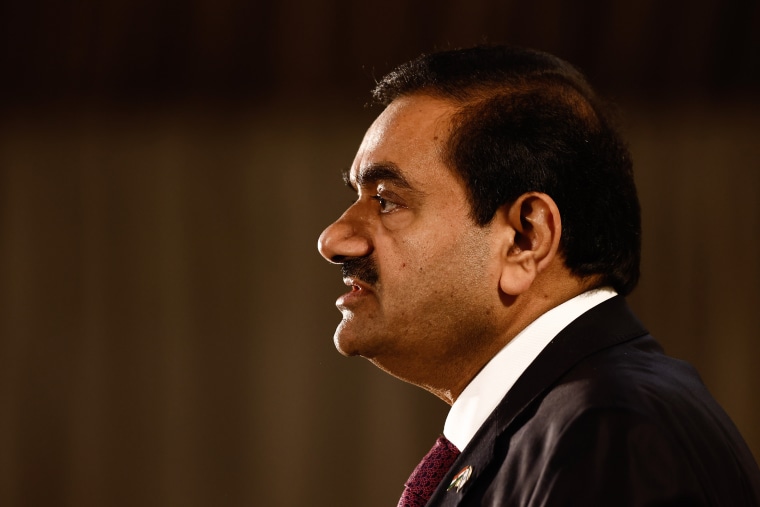[ad_1]
Gautam Adani rose from college dropout to become Asia’s richest man — but now he’s seen his empire rocked by a week of turmoil.
The Indian tycoon has lost his title, and tens of billions in personal wealth, in a matter of days after a U.S.-based short-selling firm accused him of “the largest con in corporate history.”
Adani dismissed the allegations and accused the short-seller, Hindenburg, of a “calculated attack” on his country.
But the claims have triggered a meltdown for his company and sent shockwaves through the markets.
On Thursday Adani abandoned his flagship company’s planned stock offering as his conglomerate’s losses topped $100 billion, deepening concerns about a potential broader impact on India’s economy.
Here’s what to know:
What are the accusations?
Hindenburg Research published a report on Jan. 24 saying the Adani Group, one of India’s biggest conglomerates, had “engaged in a brazen stock manipulation and accounting fraud scheme over the course of decades.”
The report was published days before the planned $2.5 billion share sale by Adani Enterprises, the conglomerate’s flagship company.
In addition to accounting fraud, Hindenburg also accused the Adani Group of being involved in billions of dollars’ worth of “suspicious dealings with its chairman’s brother, Vinod Adani, and his labyrinth of offshore shell entities,” which it says the company used for stock manipulation.
Hindenburg has a track record of exposing alleged corporate wrongdoing while placing bets against these companies, a process also known as short selling. Hindenburg disclosed that it held short positions in Adani’s companies through assets traded in the United States and non-Indian-traded derivative instruments, which experts said positioned it to benefit from a drop in share prices.
The report, which Hindenburg said was based on interviews with former executives and research from thousands of documents, raised concerns about high debt and the activities of top executives and concluded that seven of Adani’s companies were overvalued.

What has Adani said?
Adani’s business hit back at Hindenburg, threatening legal action and accusing it of sabotaging the share sale.
“The volatility in Indian stock markets created by the report is of great concern and has led to unwanted anguish for Indian citizens,” the conglomerate said in a statement last week.
In another 413-page response a few days later, Adani dismissed Hindenburg’s accusations as baseless, calling the short-seller the “Madoffs of Manhattan.”
“This is not merely an unwarranted attack on any specific company but a calculated attack on India, the independence, integrity and quality of Indian institutions, and the growth story and ambition of India,” Adani’s statement said.
Hindenburg replied that only about 30 of those pages addressed issues raised in its report, and that Adani had not answered 62 of its 88 questions.
“India’s future is being held back by the Adani Group, which has draped itself in the Indian flag while systematically looting the nation,” the research group said. “We also believe that fraud is fraud, even when it’s perpetrated by one of the wealthiest individuals in the world.”
Hindenburg Research and the Adani Group did not respond to a request for additional comment.
How bad has the damage been?
Though Adani denied the allegations, the report resulted in a mass selloff of shares in the Adani Group’s listed companies, which according to Bloomberg have lost $107 billion in value.
Adani himself has lost $48.5 billion of his $120 billion fortune, according to the Bloomberg Billionaires Index, where he has fallen from third on the list to 13th. He has also slipped one spot below his rival and fellow Indian tycoon Mukesh Ambani, the chairman of Reliance Industries.
The record domestic share sale had been seen as a measure of market confidence in Adani after the report, and it initially had enough investor support to proceed on Tuesday. But the conglomerate called it off late Wednesday, citing “market volatility.”
“This decision will not have any impact on our existing operations as well as our future plans,” Adani said in a recorded video address aiming to calm investors that was released on Thursday, his first public comments since the crisis began.
Adani said the decision to scrap the share offering was made “to insulate the investors from potential losses.”
“For me, the interest of my investors is paramount and everything else is secondary,” he said. “We will continue to focus on timely executions and delivery of projects,” he said.
But the damage may have been done. Since Hindenburg’s report was released on Jan. 24, Adani group companies have lost nearly half their combined market value.
“Unless Adani is able to regain the confidence of institutional investors, stocks will be in freefall,” Avinash Gorakshakar, head of research at Mumbai-based Profitmart Securities, told Reuters.
[ad_2]
Source link
